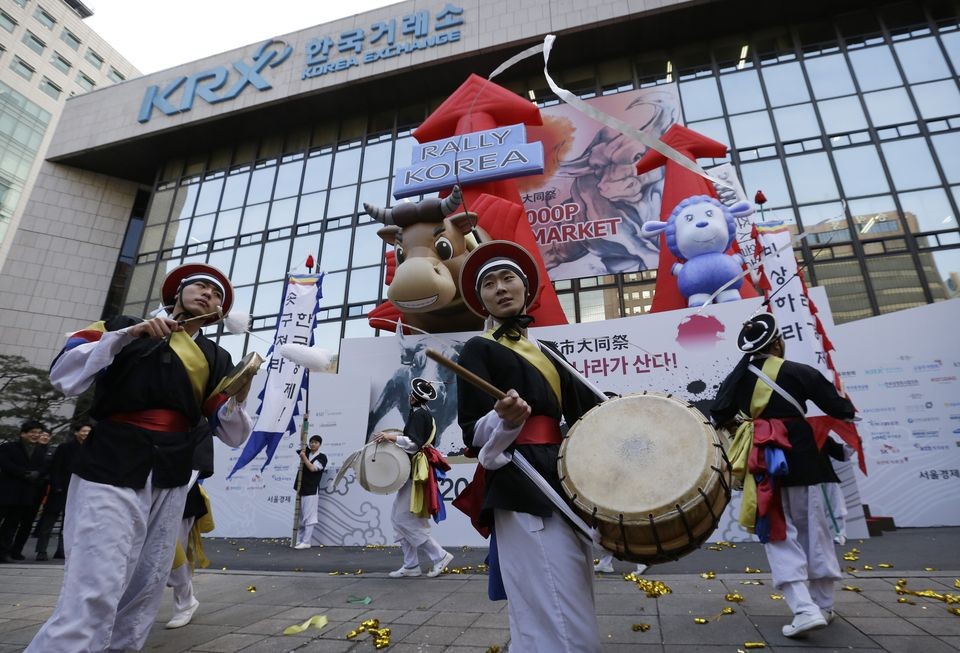Two South Korean Stocks To Buy For 2015
Post on: 8 Июль, 2015 No Comment

Error.
Dec. 24, 2014 12:48 a.m. ET
The brightest star in the galaxy. That’s a slogan Samsung uses to market its latest line of smartphones.
However, the Kospi Composite Index, of which Samsung Electronics makes up around 17%, has been anything but the brightest star in the Asian equities universe this year. South Korea’s main stock index is currently 2% below where it opened 2014. That compares to a 30% gain by India’s BSE Sensex, Asia best performing index this year, and a 12% rise by Japan’s Nikkei 225.
A slowdown of economic growth in China, Korea’s largest trading partner, and an aggressive deprecation in the value of the Japanese yen had weighed down earnings for the country’s export-driven companies. Meanwhile, the Sewol ferry disaster in April had cast a pall over consumer sentiment and the recovery in the Korean property market.
However, 2015 could see the sun shine on Korean stocks. Chanik Park, head of Korea equity research at Barclays, is upbeat, with a forecast for the Kopsi Composite to rise to 2,300 points in 2015. This is about 18% higher than its current levels around 1,942 points.
Korean companies in general have a notorious reputation for skimping on dividend payments. At a miserly 1%, the group’s dividend yield is among the lowest in the world. The low payout has been a key reason for the 20% discount at which Korean stocks have been trading relative to Asian peers since 2000.
However, Seoul is looking to change that. New corporate taxes are set to be introduced next year to encourage companies to make higher payouts. Barclays’ Park expects that any positive changes in dividend payment policy would lead to a reduction in the discount on Korean stocks.
A change in government policy towards corporate pension schemes could boost liquidity for Korea’s stock market next year. In August, Seoul lifted the proportion of funds that certain pension plans could allocate to stocks to 70% from a previous 40%.
The macroeconomic environment is also expected to turn more favorable for Korean companies next year. Park writes, “2015 will be the first year for Korean exporters to see a better global macro environment and currency.”
Global growth, which is seen as key driver for the profitability of Korean companies, is expected to rise to 3.5% from this year’s 3.1% on the back of the U.S. economic recovery. Meanwhile, the Korean won is expected to depreciate to KRW1150 against the dollar from current levels around KRW1103 against the dollar.
The Bank of Korea is also likely to refrain from hiking interest rates until the third quarter of 2015 due to lower -than-expected inflationary pressures as a result of declining commodity prices, says Barclays’ senior Asia economist Wai Ho Leong. In addition, China’s economic growth may surprise to the upside, notes Barclays equity research head Chaik Park.
Given the positive catalysts, Park is overweight on the auto and technology sectors, which stand to benefit from improved global economic growth. Many of the companies are cash rich and are well positioned to lift payouts amid a shift in investors’ attention towards dividend policy. Park, however, is underweight on the food and beverage, tobacco, chemicals and shipbuilding sectors, which have demanding valuations and weak earnings visibility.
Among Park’s top picks for the auto sector is Hyundai Mobis (012330.KR ). The company is the vehicle components arm of chaebol Hyundai Motor Group. Having fallen about 23% since August, Hyundai Mobis’ current share price of around KRW238,500 is equal to six times projected earnings, which is just slightly above its five year low.
Kyung-moon Nam, a Seoul-based analyst at Yuanta Securities, expects the company’s operating profit to increase around 12% next year on increased demand for high-end components as automakers release new vehicle models. The profit increase will be helped by an expected turnaround by Hyundai Mobis’ loss-making finance business. Cash and short term investments make up around a fifth of the company’s assets. Analysts surveyed by FactSet have a target price of KRW314,400, which implies 32% upside.
For the technology sector, Park names Samsung Electronics (005930.KR ) as one of his top picks. The stock has recently rebounded from a two year low and currently trades at around KRW1,340,000, which translates to 11 times forward earnings. Our U.S. colleague Andrew Barry took a bullish view on the stock in his October cover story, writing that Samsung Electronics, which is currently worth $221 billion, could be the world’s cheapest mega-cap stock.
Jefferies analyst Sundeep Bajikar agrees Samsung Electronics is a buy. “We expect product progress and share buybacks to lift investor sentiment,” wrote Bajikar, who sees 19% upside. Meanwhile, Barclays’ Park points to strong growth in Samsung Electronics’ memory business and expected progress on improvements in the chaebol’s dividend policy. The street’s average target price of KRW1,484,000 is around 10% above Samsung Electronics’ share price.
Although it’s unlikely the Kospi Composite will see the kind of following that Korean pop star PSY got for his Gangnam Style video on YouTube, it could give investors plenty to dance about if expectations are met.














